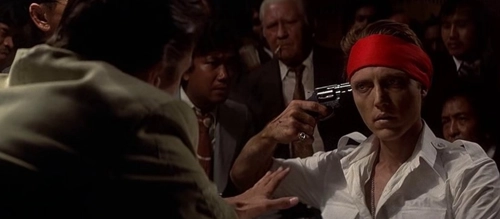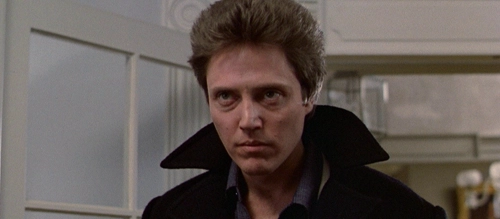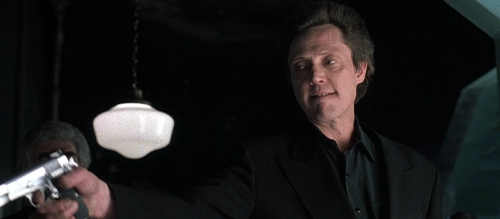Christopher Walken: 3 Career-Defining Performances
Christopher Walken has been a continual presence on screen since he began his film career in Sidney Lumet’s The Anderson Tapes in 1971, transitioning from the off-Broadway productions and nightclub work where he originally honed his craft. In the ensuing five decades he has established himself as one of the most complete and unique performers working today.
Walken has showcased his dramatic power in Oscar-winning performances in dramas such as Michael Cimino’s The Deer Hunter (1978) and brought his dead-eyed intensity to blockbuster villain work in the likes of A View to a Kill (1985) and Batman Returns (1992). The often-impersonated quirks in his style, alongside his enigmatic charisma, have allowed him to make scene-stealing cameos á la Quentin Tarantino’s Pulp Fiction (1994) and Steven Spielberg’s Catch Me If You Can (2002). His musical performances in the iconic Fatboy Slim video for “Weapon of Choice” or even in the 2007 remake of Hairspray speak for themselves. At eighty years old he has never been a more loved or sought after figure, maintaining longevity through his individuality, humour and underrated sensitivity that he brings to each project.
These three performances are him at his best. When he is able to freely express all of his talents in a lead role. His mouth twitches and his focus flickers, he moves in strange patterns across the screen as a lost young soldier, a cursed man, and a criminal monster. All three of them are doomed and despite the fact that we all know how their stories will end, Walken’s presence makes it impossible to tear your eyes away from their tragedies. These are Christopher Walken’s 3 Career-Defining Performances.
Follow @thefilmagazine on Twitter.
1. The Deer Hunter (1978)

Michael Cimino’s 1978 Vietnam epic tells the story of three steelworkers, from a Slavic-American immigrant community in Pennsylvania, who are plunged into the depths of the Vietnam War. The film deals with how the men’s wartime trauma severs them from their community, even as it attempts to reintegrate them.
Walken plays Nikanor Chevotarevich (or ‘Nick’), one of the boys who goes to fight for his country and descends into heroin addiction and gambling on his life in Russian Roulette. In this character, he portrays the most tragic outcome of Cimino’s premise.
The first hour of the film focuses on the hard-drinking camaraderie of the group of male friends, Walken excelling at portraying Nick’s boisterous energy (offering an extended example of his dancing abilities during the Russian wedding). He gives Nick a magnetic charm that people rarely associate with Walken, which extends to his relationships with the other men in the group. Nick is equally at ease quietly hunting with Robert De Niro’s Mike, swiping at John Cazale, and sharing tender, joyous moments with Meryl Streep. Walken gives us an intoxicatingly credible depiction of a man enthralled by the possibility of his youth.
The palpable freedom of spirit makes Nick’s unravelling more brutal, as Walken captures both the emotional extremes of his torture by the Viet-Cong and the collapse of Nick’s sense of self as a result of the ensuing trauma. The first Russian roulette scene feels as if De Niro and Walken are pushing themselves to the edge of a mental abyss. You can practically smell the sweat through the screen as Nick is just about held in the present by the slap of Mike’s voice. Walken shows that salvation from that situation comes at a high price. The memory of the bright young man from Pennsylvania has been shattered. His eyes become dark, expressionless caverns and his face begins to take on a studied blankness that becomes more sinister as his character recedes into the underbelly of Hanoi.
In Mike’s final, doomed attempt to retrieve him, we see Walken complete Nick’s metamorphosis. He has become a heroin-addled shell, barely emoting except a brief malevolent smile as he once again puts a pistol to his familiar temple. His eyes are now glassy and spectral and, in watching this scene, we become aware that Nick is trapped between the hollow clicks that issue from the empty chamber. Unable to move back from the trauma of his experiences, irrevocably aware of what awaits on the next pull of the trigger.
The devastating honesty of Walken’s performance makes the human drama intensely compelling in its exploration of the effects of combat. Walken showed himself to be a truly heartbreaking actor, recognised with an Academy Award for Supporting Actor and announcing himself as a legitimate star more than capable of sharing the screen with any of the greats of his generation.
2. The Dead Zone (1983)

Following his breakout in The Deer Hunter, it would take a couple of films for Walken to be given the space to test his talents for a strange kind of humanity (diverting as he is in the vaguely schlocky John Irvin film The Dogs of War). He found the perfect space to experiment more with his eccentricities alongside master horror and thriller director David Cronenberg, with a story from the mind of Stephen King. The Dead Zone is a thriller about schoolteacher Johnny Smith who suffers a horrific car crash and spends five years in a coma. When he wakes up he is able to see people’s horrific pasts and futures by touch.
In this role, Walken once again plays a man who is separated from society and forced to come to terms with his transformative circumstances. Unlike Nick, who is mentally fragmented by the effects of war, Johnny must deal with his broken body and the loss of his marriage as a result of his coma and the alienation he suffers from announcing his psychic abilities. He plays Johnny with an overwhelming sense of decency, despite his justifiable frustration with his circumstances. He reacts to the traumatic visions that he witnesses in an intensely believable way, showing lasting pain and disorientation from these experiences. He commendably avoids any macho-posturing that lesser actors might have given the character.
There is a sense of powerlessness even in the scenes where he does lose control of his anger, such as smashing a vase when trying to convince Anthony Zerbe’s businessman to believe his premonitions of his son’s impending death. The sadness on Walken’s washed-out face tells you that this is nothing more than the legitimate outburst of a man imprisoned by his knowledge of a world no one else can see.
He makes even more great choices in the scenes with Brooke Adams (as Sarah), the woman he was supposed to marry before the accident. Walken keeps himself as self-contained as possible, mouth twitching into quickly smothered half-smiles, sneaking glances at her as he unsuccessfully tries to spare her from his anguish. Johnny Smith is as unsteady on his feet as he is at interacting with Sarah. This broken, powerful connection between the two actors clues us in to the heavy realisation that Johnny Smith would rather he never woke up.
Walken’s performance in this film is perhaps one of his most understated and disciplined. For an actor that exists in the public imagination by the way he is caricatured by others, his work as Johnny Smith is a powerful reminder of his supreme understanding of his craft. You feel nothing but sympathy for this blandly named man. The humanity in Walken’s work makes it required viewing for Cronenberg fans and cements its place as one of the best Stephen King adaptations ever put to screen.
3. King of New York (1990)

In the new decade, alongside the Bronx-born king of sleaze, Abel Ferrara, Christopher Walken cemented his status as a cinematic icon. In his role as the titular King of New York, mobster Frank White, he wraps the Shakespearean gangster classic round his Machiavellian fingers like garotte wire.
White demanded Walken at his most reptilian, a human embodiment of the amoral excesses that surround the Arctic, cocaine-pounding heart of the city. It is a distillation of the small techniques that make his acting style so fundamentally watchable and unique. The playful shifts in facial expression, the unnerving hesitations, the clear dead eyes that snap focus like a neck. Frank White lurches between lust, violence, anger and joy sometimes in a single scene. All with a bleakly self-aware sense of irony about himself, as if his existence is some kind of Satanic joke. In his first meeting with his old gang following his release from prison, White tries on the glove of an old enemy they have gunned down on his release. “King Tito’s glove,” he gleefully mumbles to a confused looking Theresa Randle, grinning in childlike awe that his power remains untouched.
Walken plays White as a man who has made up his mind to take as much from life as possible before it takes everything from him. This awareness is what makes scenes such as his reckless killing of Frank Caruso’s violent cop Dennis at a police funeral all the more chilling. White does not waste any time verbalising his revenge, he simply rolls down the window of his limo, with a stare harder than the lead in his shotgun, and says “hey you.”
These chilling scenes are interspersed with Walken exercising his snakelike charm as he hobnobs with the various New York power players. He shows himself to be equally adept flirting with lawyers and flattering newspaper editors as he is making drug deals at a hospital. Walken lends White a seductive, vampiric quality to contrast the emotionless way in which he delivers violence. He is an Americanised update on the Dracula of Christopher Lee, trading his fangs for a gun, feasting on money and despair. Supported by the continued hypocrisy of the municipal institutions that publicly disavow him.
Walken and Ferrara are too honest to engage in the slow unmasking that takes place in traditional vampire stories. There are no illusions around Frank White. He is at once completely connected to the city, safe to haunt the subways alone, as he is to swim with the sharks in the Plaza hotel. A man just as capable of exploding into dance as he is into violence. It is an exceptionally complex performance that Walken makes look effortless, providing a level of intense detachment that makes Frank White simultaneously the sanest and most deranged character in the film.
It is the greatest performance Christopher Walken has ever given and, although the film was not particularly successful or recognised upon its release, King of New York is now rightly understood to be one of the classics of the genre; the dirty cousin to Goodfellas and The Godfather.
Recommended for you: Laurence Fishburne: 3 Career-Defining Performances
Christopher Walken has managed an exceptional, independent career over the past five decades. He remains an inevitably memorable presence regardless of the quality of the film around him. These three films are some of the best examples of him exploring his full range of talents and are some of his most complex performances, but he is equally compelling even if he appears in a single scene. When asked about his choice to hire Walken for his science-fiction drama ‘Severance’, Ben Stiller simply replied “because I’m not crazy.”
Written by Joshua Imas
You can find Joshua Imas online via Medium at medium.com/@s.imas.

